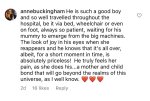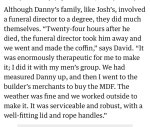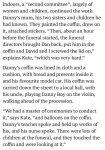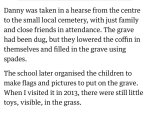TW: talking about the terminal illness and death of a child.
I’ve gone to mention this a couple of times & hesitated, given the subject content but I truly believe there’s something in this that we can all learn from.
Back in Feb, I was listening to an episode of Desert Island Discs (I’m a big fan

) featuring Professor Sir David Spiegelhalter. He’s a mathematician, specialising in medical statistics. If his name is vaguely familiar, that’s because he’s often been interviewed re:covid.
His son Danny developed retinoblastoma (eye cancer) at the age of 11 months. He endured intensive treatment including radiotherapy, chemotherapy, a STEM cell transplant etc but by the age of 5 years, Danny was still very unwell & in Sir David’s words “We knew he’d had enough so we stopped treatment so we could take him home, be with him and he could die in our arms”.
Sir David went on to describe a period of acceptance and adjustment for Danny & the whole family and after he’d passed, over 100 people - & even most of his classmates - came to say “Goodbye” (Danny was dressed in his Virgil Tracy Thunderbirds suit).
The family found the Natural Death Handbook incredibly helpful. Sir David made his son’s coffin, by hand and another family team made a beautiful lining.
I learnt a lot from this heartbreaking story. Death is a part of life, it is - in many ways - natural to fear it but there is a way through (especially if you have a period of terminal illness prior to the death).
I’m afraid I have little time for the “Life At All Costs” movement, whether they are motivated by “religion” or any other reason. I’ve seen so much suffering, mostly in animals but also in humans. It need not be that way.
More info via the Desert Island Discs podcast (BBC Sounds app or your usual podcast provider): Professor Sir David Spiegelhalter episode. Conversation turns to Danny at approx 19 mins & 20 seconds in and lasts for 6 minutes. Also via this article from The Guardian:-





